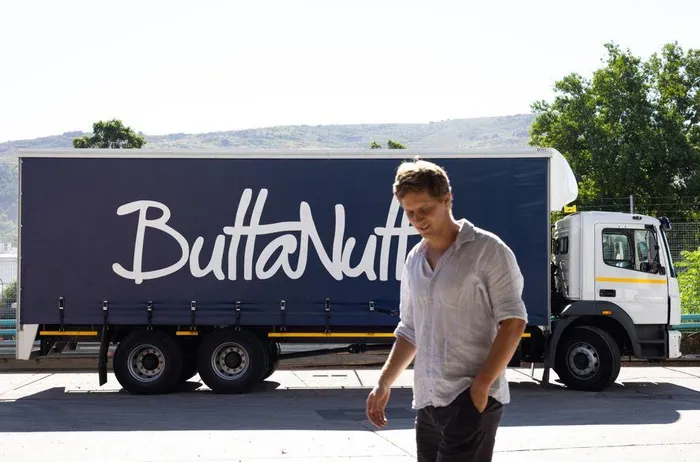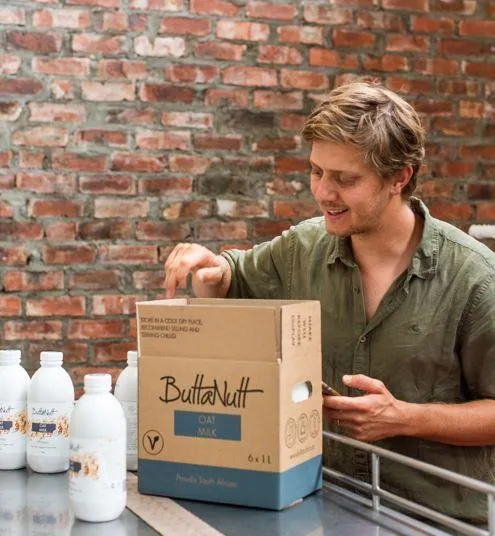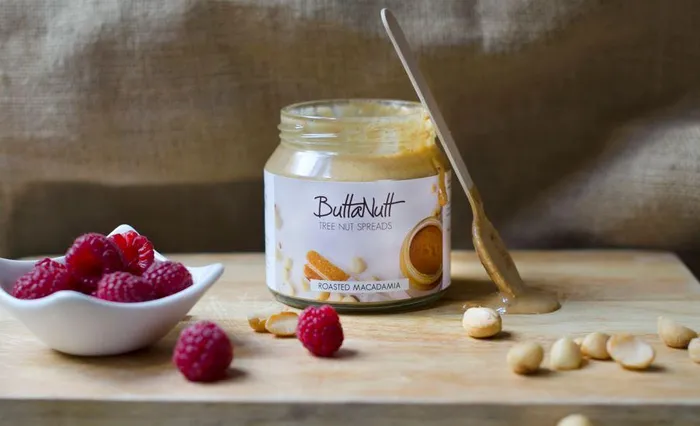
Antoine van Heerden, founder of ButtaNutt.
Image: Supplied.
What began as a university passion project has blossomed into one of South Africa’s most recognisable plant-based food brands.
For Antoine van Heerden, founder of ButtaNutt, the path from engineering student to food entrepreneur was shaped by family roots and a love for wholesome, local produce.
“My parents started farming full-time when I moved down to Stellenbosch. Holidays were spent harvesting macadamias and litchis or helping out at the farm stall. With my sister studying cooking, I was exposed to the food industry from farm to fork. The pivot to food felt natural” van Heerden said.
Founded in 2013, ButtaNutt began as a stall at local markets, selling handcrafted nut butters.
But as the plant-based movement grew globally, so too did the brand’s ambition.
By 2020, ButtaNutt had entered the plant-based milk space, a decision that has paid off, with triple-digit growth recorded year after year.
“The consumption frequency of plant-based milks is much higher than that of nut spreads, so we were playing catch-up for a while,” van Heerden said.
“Brand presence, formulation, and pricing played a big role. We were able to compete with imported products early on, even without scale efficiencies.”

Antoine van Heerden, founder of ButtaNutt.
Image: Supplied.
Despite the success, van Heerden noted that scaling a South African plant-based brand came with its challenges. These included access to capital, hiring the right people, and striking the delicate balance between quality and affordability.
“Inherently, we have been a clean-label, simple foods brand,” he said.
“The innovation is often more about solving efficiency and route-to-market challenges. Once you achieve scale, you can narrow the premium gap between niche and conventional categories.”
ButtaNutt’s approach to product development has always centred on transparency and trust. With label literacy on the rise, van Heerden said the company prioritised simple, honest ingredients and clear communication with consumers.
“Transparency empowers consumers to make informed choices. While the regulations around labelling are still evolving, our commitment is to include only what is necessary for nutrition, safety, or quality,” he said.
This commitment to clean, conscious food extends to ButtaNutt’s sustainability philosophy. The company has long emphasised local sourcing and minimal processing, working closely with South African farmers.
“We provide our farmers with a reliable, stable monthly demand that’s easy to manage. We’ve grown alongside them in both volume and quality over the past decade,” van Heerden said.
Their innovations are not limited to milks and spreads. One of their more recent products, a gluten- and dairy-free oat rusk, was born from the desire to upcycle oat fibre removed during the hydrolisation process.
“Some product development comes naturally. Rusks were a solution we knew would work,” van Heerden said.

While ButtaNutt has its eyes on regional expansion, van Heerden insisted that their focus would remain firmly on the South African consumer.
Image: Supplied.
“The first question we get is always, ‘But is it any good?’”
In 2025, ButtaNutt entered into a strategic partnership with PSG Group, a move van Heerden said injected new energy into the business and provided the working capital needed for its next growth phase.
“We anticipate strong growth in our high-oleic peanut butter and are planning to launch ready-to-drink plant-based beverages with high protein and nutrient fortification,” he said.
“These innovations will increase demand for diverse local crops and create new opportunities for farmers.”
While ButtaNutt has its eyes on regional expansion, van Heerden insisted that their focus would remain firmly on the South African consumer.
“There’s potential in Southern Africa, but making a plant-based product accessible to all income levels remains a challenge,” he said.
“Our primary focus will always be the South African market. Anything abroad is secondary to that.”
Looking ahead, van Heerden believed plant-based milks would soon move from niche to mainstream.
“The next five years will see plant-based milks become fully integrated into everyday diets,” he said.
“The category will no longer be just for vegans. Health, sustainability, and taste will drive adoption across all demographics.”
Reflecting on ButtaNutt’s journey, van Heerden said one standout moment was seeing their production line up and running inside the old Rembrandt cigarette factory in Paarl.
“Producing plant-based milks in that historic building was a wonderful sight,” he said.
Ultimately, van Heerden hoped ButtaNutt would leave a lasting mark on South African food culture.
“We take pride in encouraging healthier, more conscious eating habits while honouring local tastes and traditions,” he said.
“We want ButtaNutt to be more than a brand. We want it to be a catalyst for positive change in South African food culture.”
As the country continues to embrace plant-based living, van Heerden and his team are proving that homegrown innovation can reshape the future, one nut, one bottle, one rusk at a time.
BUSINESS REPORT